Share
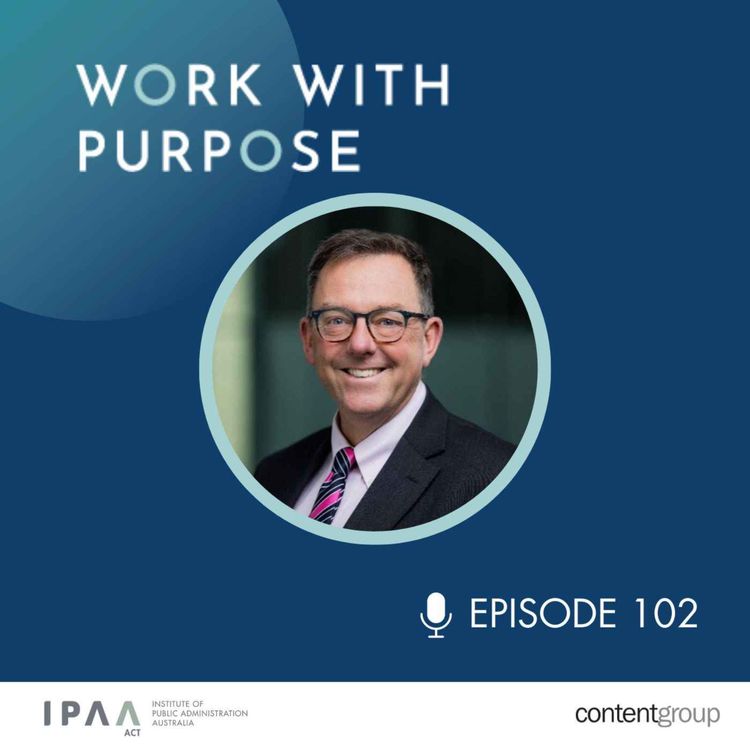
Work with Purpose: A podcast about the Australian Public Sector
EP#102: A blueprint for innovation success with Michael Schwager
On today’s Work with Purpose episode, Director General of IP Australia, Michael Schwager tells IP Australia’s innovation success story, and how the broader public sector can follow in its steps.
Did you know that 57 per cent of IP Australia's staff rate their culture as positively supporting innovation, 18 per cent higher than the APS average? Today, we hear from with Michael Schwager, Director General of IP Australia, about pioneering innovation in the public sector in conversation with host David Pembroke.
Michael shares how IP Australia balances risk and innovation to create a culture where new ideas thrive, and failures are learning opportunities. He also offers practical advice and examples from his experiences on how public sector bodies and individuals can drive forward-thinking initiatives.
Show notes:
· TM checker tool | An example of innovation
· Observatory of Public Sector Innovation | OECD
· Behaviourial economics | Innovative practice
· ATO Cyber Program | Innovation in digital solutions | OECD
More episodes
View all episodes
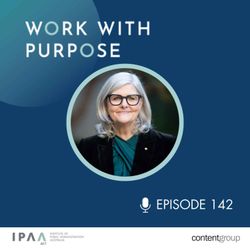
153. EP#153: Revisiting 'Care, kindness, and respect: A conversation with the Governor-General'
53:40||Season 1, Ep. 153In this landmark episode of Work with Purpose, host David Pembroke sits down with Her Excellency the Honourable Ms Sam Mostyn AC, Australia’s 28th Governor-General, for a deeply personal and wide-ranging conversation recorded at Government House.Marking one year and one day since her appointment, the Governor-General reflects on her journey from suburban Canberra to one of the nation’s highest offices. She shares insights into her upbringing, career, and the values that guide her leadership – care, kindness, and respect.Listeners will gain a rare glimpse into the evolving role of civic institutions, the importance of inclusive public service, and the power of storytelling in shaping national identity. From her early volunteerism to her work in law, sport, climate, and social justice, the Governor-General’s story is one of curiosity, courage, and commitment to community.In this episode, you’ll hear about her path to Governor-General, why care, kindness, and respect are central to her vision for modern leadership and public service, and how her diverse career shaped a holistic view of Australia’s institutions and the people who power them.This episode is a must-listen for anyone who cares about Australia’s future, the role of public service, and the values that bind us together.Key tipsChampion civics education. Help build a more informed and engaged society by promoting understanding of Australia’s democratic systems and institutionsCollaborate across sectors. Break down silos between public, private, and community sectors to foster innovation and shared purposeLead with compassion. Embed care and kindness into everyday decision-making – whether in policy, leadership, or community engagement.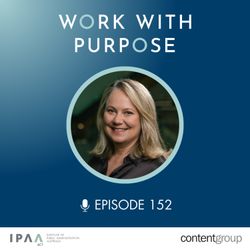
152. EP#152: Designing for Delivery: How IP Australia Builds Trust, Innovation & Better Public Service
34:50||Season 1, Ep. 152Have you ever considered what it takes to design public services that keep pace with technology while staying genuinely human-centred?In this episode of Work with Purpose, IP Australia Deputy Director-General Margaret Tregurtha joins Wendy Cohen, Deputy CEO of IPAA, to explore how modern public institutions can foster innovation, build trust and deliver services that meet evolving community needs.Listeners will gain a clear understanding of how intellectual property underpins Australia’s economic and cultural wellbeing, why recognising and protecting First Nations knowledge is essential to a fair and modern IP system, and what responsible adoption of emerging technologies like AI really looks like in practice.The conversation also highlights the mindsets and capabilities needed to drive meaningful change inside government, from embedding transparency and inclusion to creating cultures that support curiosity and continuous improvement. It offers a practical and grounded look at what it takes to build public services that are trusted, adaptive and ready for the future.Key TakeawaysHuman centred design is essential for modern public services.True transformation happens when services are built around people's real needs and expectations, not just new technology.Protecting First Nations knowledge strengthens Australia's innovation system.Recognising and safeguarding Indigenous Cultural and Intellectual Property is vital for fairness, cultural resilience and a modern IP framework.Responsible innovation depends on clear governance and a culture of curiosity.Emerging technologies like AI deliver public value only when supported by strong risk frameworks, purposeful leadership and teams empowered to learn and experiment.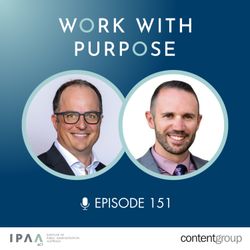
151. EP#151: International Men's Day: Be a Role Model
57:47||Season 1, Ep. 151In this special International Men’s Day episode, Work with Purpose host David Pembroke, Founder and CEO of contentgroup, brings together two senior public sector leaders to explore what male role modelling looks like in practice, not in theory.Deputy Secretary David Mackay (Regions, Cities and Territories, Department of Infrastructure, Transport, Regional Development, Communications, Sport and the Arts) and Michael Pohl (National Manager for Smart Centres across Regional NSW and the ACT at Services Australia) share candid reflections on leadership, identity, caregiving, cultural background, and the real pressures of balancing demanding roles with busy family lives.Listeners will hear lived experience, practical behaviours, First Nations perspectives, and personal stories that illuminate the difference male leaders can make in shaping respectful, healthy public sector workplaces.Key TipsPeople remember how leaders make them feel: small moments of validation or dismissal shape workplace culture more powerfully than formal feedbackLead with questions, not answers: curiosity and humility help unlock team insight, build trust, and create stronger decisionsNormalise shared caregiving: taking parental leave and protecting family time strengthens leaders and helps shift outdated gender normsBe honest about the chaos: vulnerability creates psychological safety and helps teams feel understood and supported Show Notes Coro Canberra (David Mackay’s choir)Hartley Cycle Challenge (Michael’s charity ride)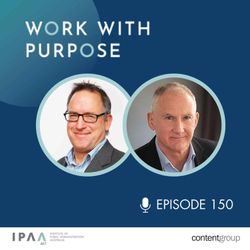
150. EP#150: Power and Decision Making — What Behavioural Science Reveals About Politics
57:02||Season 1, Ep. 150Have you ever wondered how political leaders decide which issues make it to the top of the agenda?In this episode of Work with Purpose, host David Pembroke speaks with Professor Liam Smith and Dr Connor Wynn from Behaviour Works Australia to explore how politicians make high-stakes decisions under pressure and what the public sector can learn from the process.Drawing on extensive behavioural research, Smith and Wynn reveal how political leaders rely on heuristics, or mental shortcuts, to navigate complexity, limited time and competing demands. They explain how community sentiment, emotion, political capital and timing influence which policies rise to prominence, and how these forces shape outcomes across government.Listeners will learn how understanding the psychology of decision making can help them engage more effectively with ministers, anticipate shifting priorities and design advice that resonates. This is an engaging conversation about influence, timing and the human side of leadership in government, offering practical guidance for anyone working in or alongside the Australian Public Service.Key tips:Use the “wait and see” principle. Recognise when an issue is gaining traction and be ready to act when political and community momentum align.Seize the moment. Identify windows of opportunity created by events, media attention or public pressure, and present advice when decision makers are most receptive.Think like your audience. Understand how leaders and communities perceive an issue, and frame advice using real-world perspectives and public sentiment, not just technical evidence.Show notes:Behaviour Works Australia – behavioural science research and case studies: behaviourworksaustralia.orgHow the political elite make decisions - Wynn - 2025 - Australian Journal of Public Administration - Wiley Online Library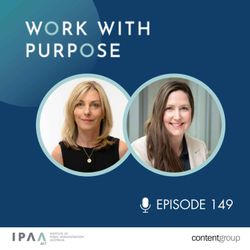
149. EP#149: Leading with Curiosity: The Future of HR in the Australian Public Service
42:41||Season 1, Ep. 149What does it really take to lead people well in a world of constant change? In this episode of Work with Purpose, host David Pembroke sits down with Jacqui Curtis, Chief Operating Officer at the ATO and Head of the APS HR Profession, and Eliza Kirkby, Managing Director at Hays, to explore how human resources in the Australian Public Service is being redefined.From the power of trust and genuine connection to the growing impact of AI and technology, Curtis and Kirkby share honest insights about what it means to be a people-focused leader today. They reveal how curiosity, courage and empathy can build stronger teams, shape culture and help leaders navigate complexity with confidence.Listeners will also hear how HR professionals are helping the APS evolve by embracing innovation, driving inclusion and belonging, and preparing for the workforce of the future. It’s an inspiring conversation about keeping people at the heart of transformation and leading with purpose when it matters most.Key tipsLead with curiosity and connection. Build trust through open communication, empathy and genuine listening. Be straightforward, approachable and real.Use technology wisely. Let AI and digital tools enhance people’s work rather than replace it.Create a sense of belonging. Inclusion and psychological safety are essential for high-performing teams.Stay open and ask for help. Strong leaders grow through curiosity and collaboration, not by having all the answers.Show notes Successful Public Governance | Utrecht UniversitySpeech to the American Society for Public Administration | Crawford School of Public PolicyPathways to Positive Public Administration An International Perspective | BookHas the time arrived for Positive Public Administration | The Mandarin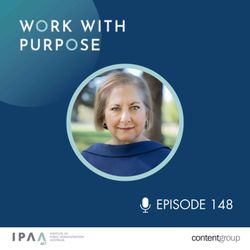
148. EP#148: Integrity, fairness and the role of the Merit Protection Commissioner
36:39||Season 1, Ep. 148In this episode of Work with Purpose, host David Pembroke speaks with Jamie Lowe, the Merit Protection Commissioner for the Australian Public Service and the Parliamentary Service, about how fairness, transparency and integrity are upheld across the APS.Described as the Commonwealth’s “workplace umpire,” Jamie and her office review promotion decisions, Code of Conduct inquiries and other workplace matters to make sure they’re not only lawful, but fair and correct. She explains how her team provides impartial review, carefully manages conflicts of interest, and works with agencies to lift capability and strengthen decision-making.Jamie also shares her career journey as a long-serving public servant, the lessons the APS can take from Robodebt, and why procedural fairness is essential in maintaining trust and confidence across the APS.Key tips:Document decisions clearly – thorough records ensure fairness and allow meaningful feedback in recruitment and promotions.Empower staff through reviews: Code of Conduct processes give people the confidence to raise concerns and strengthen workplace culture.Own-motion audits, shared case studies and communities of practice improve decision-making and integrity across the APS.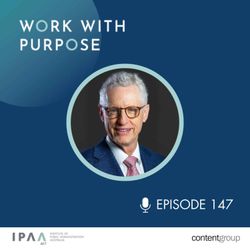
147. EP#147: Building a data-driven Public Service
28:58||Season 1, Ep. 147In this episode of Work with Purpose, David Pembroke speaks with Dr David Gruen AO Australian Statistician and the inaugural head of the APS Data Profession about the transformative role data plays in the public sector.The APS Data Profession, launched in 2020, it has grown from a pilot into a thriving community of 13,500 members across Commonwealth, state and territory governments. The profession is about more than technical skills. It’s building a culture of evidence-based decision making, giving leaders confidence in using data, and opening career pathways through graduate streams and cadet programs.Dr Gruen reflects on how communities of practice, the Data Capability Framework, and initiatives like the Data Awards are shaping a smarter, more collaborative public service ready for challenges like AI and machine learning.Key takeaways:Why data matters in government – the APS Data profession is building skills and a culture that supports evidence-based decisions.How the data profession is growing - from graduate programs to communities of practice, creating a strong pipeline of talent and collaborationWhat leaders need to know – why senior executives and decision makers must understand data to better shape outcomes for Australian citizens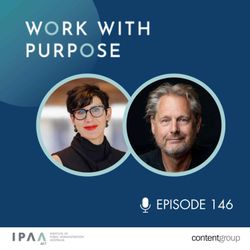
146. EP#146: Thinking smarter: Evidence, bias and better public decisions
50:27||Season 1, Ep. 146How do public servants make smart decisions when time is short and the stakes are high?In this episode, host David Pembroke is joined by two leading experts in organisational decision-making: Eric Barends, Managing Director of the Centre for Evidence-Based Management, and Alessandra Capezio, Associate Professor of Organisational Behaviour at the Australian National University. Together, they explore how public servants can make better decisions by combining data, research, stakeholder input, and professional experience.The conversation delves into the challenges of balancing instinct and evidence in fast-paced environments, the risks of relying on heuristics and cognitive biases, and the importance of cultivating a culture that supports critical thinking and evidence-informed practice.Key tips: Use multiple sources of evidence to support decision-making. Avoid relying solely on personal experience; combine organisational data, scientific research, stakeholder perspectives, and expert judgement.Challenge cognitive biases. Recognise common pitfalls like solution fixation and authority bias, and ask critical questions to uncover root causes.Build capability and culture. Equip teams with the skills and shared language to critically appraise evidence, even under time pressure, and foster leadership that values evidence-based practice.Show notes:Evidence-based tools and resources | Center for Evidence-Based Management websiteOnline course on evidence-based management | CEBMaEBDM support, short courses and bespoke offerings | Associate Professor Alessandra Capezio via ANU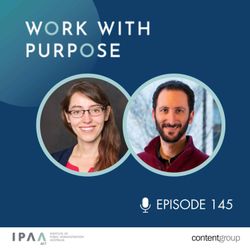
145. EP#145: Voices beyond the ballot: How letters shape Australian politics
29:27||Season 1, Ep. 145Have you ever written to a politician? What did you hope to achieve?In this episode of Work with Purpose, guest host Andrew Metcalfe AO FIPAA explores the power of personal correspondence in shaping Australia's political landscape. With around 150,000 letters and emails received annually by the Prime Minister, new research is shedding light on how these messages influence policy and public discourse.Dr Daniel Casey and Dr Marija Taflaga from the Australian National University unpack the findings of Daniel's research into letters sent to Prime Minister John Howard between 1996 and 2000, and discuss broader insights from the POLEVPOP project on how politicians evaluate public opinion.From heartfelt pleas and policy critiques to unexpected administrative revelations, this episode reveals how everyday Australians have helped shape the national agenda – one letter at a time.Key tips:Write to policymakers – letters from the public are a vital democratic tool, offering depth and context beyond the ballot box.Tell your story. Personal stories – especially those that tug at the heart – can leave a lasting impression on policymakersOpt for handwritten or emailed letters. Despite the rise of social media, private correspondence remains a powerful and personal form of civic engagement.Show notes:How politicians evaluate public opinion (POLEVPOP) | ANUExplore one of the featured letters: Jeffrey Funerals letter to the PM (1996) | via Daniel CaseyDaniel Casey, 'Dear John...': Letters from the public to Prime Minister Howard | UNSW Library